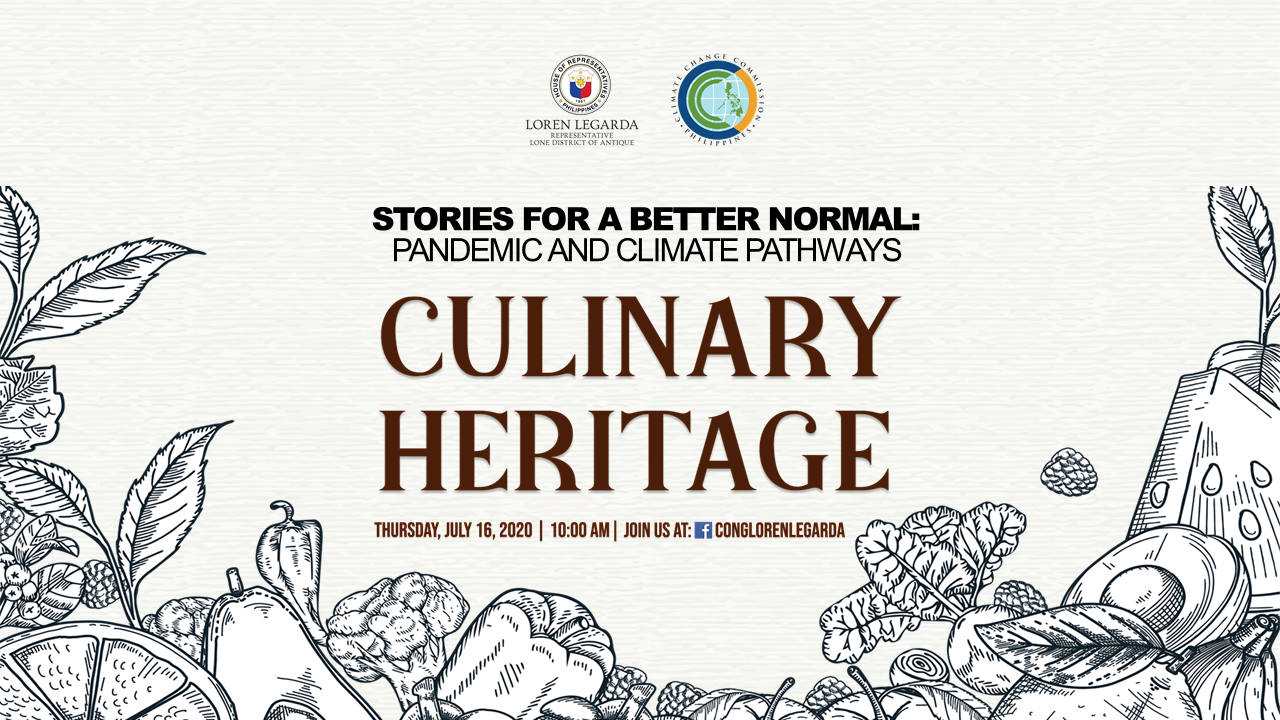
July 17, 2020 Friday

MANILA, 18 July 2020 — The ninth episode of “Stories for a Better Normal: Pandemic and Climate Pathways” featured the country’s culinary heritage from various regions of the Philippines, in a discussion hosted by House Deputy Speaker and Antique Representative Loren Legarda with chefs and culinary authors aired via Facebook Live. The guest experts and their life work underscored the importance of preserving local food and culinary heritage through adaptive and sustainable diets.
The online conversation featured Ms. Luth Camiña from Camiña Balay nga Bato in Iloilo; Datu Shariff Pendatun III, chef and author of “On The Cuisine of Muslim Mindanao"; Ms. Amy Besa, author and restaurateur-owner of Purple Yam in New York; Ms. Louella Eslao-Alix, culinary heritage author; Chef Jam Melchor, founder of the Philippine Culinary Heritage Movement and head of the Slow Food Youth Network Philippines; and Mr. Arvin Villalon, National Cultural Mapping Facilitator from the National Commission for Culture and the Arts (NCCA).
Chef Melchor discussed the kinds of heritage food in the Philippines registered under the Ark of Taste of the Slow Food Network International. He also emphasized the importance of recognizing gastronomy and Philippine culinary arts as an integral part of National Arts.
“Napaka-importante po na pinag-uusapan natin ang culinary heritage, dahil dapat maintindihan na ang Filipino food will always be part of our culture. Hindi lang ito pantawid gutom, but it’s definitely part of our identity as Filipinos,” said Melchor.
Chef Pendatun explained the distinctive culinary ingredients, tastes, and techniques in Muslim Mindanao.
“Fundamentally, the cuisines of Muslim Mindanao are just different permutations of the ingredients that everybody else uses in the region. Most people use coconut, some people use galangal, most people use ginger, everybody uses onion and garlic. The cuisines that we have there are just permutations of these, they’re just combinations. It’s how we apply them that makes them unique,” said Pendatun.
Ms. Besa shared how Purple Yam utilizes the most underused produce or ingredients in their dishes.
“Nag-umpisa kami dito sa Amerika, na-influence kami ni Alice Waters, noong 1980s. In-apply namin yung pagmamahal sa cuisine o pagkain, kasi ginawa ng mga Amerikano yun dito...Ganun ang ginawa namin for Filipino and also Southeast Asian dishes. We always looked to the west, we never look at our Southeast Asian neighbors with whom we really have a lot in common,” said Besa.
Ms. Alix shared the Cebuanos’ unique history of eating what they love and what is available around their surroundings.
“Cebuanos are mostly traders, because we cannot have big farms. Geography plays a big part in our choice of food. So mostly, we like seafood,“ said Alix.
Ms. Camiña shared the local ingredients used in Ilonggo heirloom dishes offered by Camiña Balay Nga Bato.
“Iloilo is a top rice producer, basically agricultural. When we opened the Camiña Balay nga Bato, we wanted an Ilonggo narrative for our dining table, and the food that we offer is basically a community collaboration of family and friends,” said Camiña.
Mr. Villalon discussed how the NCCA ensures the preservation and promotion of our indigenous food and culinary heritage.
“Culinary art is so important, because first it provides a sense of identity and continuity. A lot of our young people are looking for identity markers. Second is social cohesion, it binds people together. It also connected to natural and tangible heritage, history, values like respect to elders, and creativity,” said Villalon.
As an online discussion to promote health, environmental consciousness, and climate-adaptive practices, Stories for a Better Normal aims to change the mindset of individuals, families, and communities to lead sustainable lives towards a healthier, safer, and much better normal than we used to have.
This online discussion is organized in partnership between the Office of Deputy Speaker Legarda and the Climate Change Commission (CCC), with support from the Institute for Climate and Sustainable Cities (ICSC), The Climate Reality Project-Philippines, and Mother Earth Foundation.